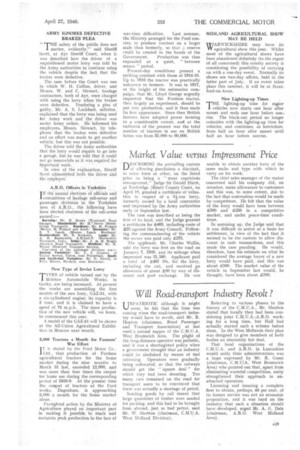Will Road-transport Industry Revolt?
Page 31

If you've noticed an error in this article please click here to report it so we can fix it.
UNP'
ATRIOTIC although it might seem. he felt that the time was coming when the road-transport industry would have to revolt, said Mr. R. Hopton (chairman, Road Passenger and Transport Association) at last week's annual supper of the C.M.U.A. West Bromwich Area. The plight of the long-distance operator was pathetic, and it was a shortsighted policy when a government thought that an industry could be abolished by means of fuel rationing. Operators were gradually being suffocated, so that the railways should get the " square deal " for which they had been shouting. Too many cars remained on the road for transport users to be convinced that there was actually a shortage of petrol. Sending goods by rail meant that large quantities of timber were needed for packing, and this had to be brought from abroad, just as had petrol, mid Mr. W. Shotton (chairman, C.M.U.A. West Midland Division). Referring to various phases in the history of the C.M.U.A., Mr. Shotton stated that locally they had been considering joint C.M.U.A.-A.R.O. working for a long time, but Hull had actually started such a scheme before them. In the West Midlands their plan was designed to give members of both bodies an absolutely fair deal.
That local organizations of the C.M.U.A. and A.R.O. in Lancashire would unify their administrations was a hope expressed by Mr. R. Guest (chairman, C.M.U.A. West Bromwich Area) who pointed out that, apart from eliminating wasteful competition, unity strengthened their approach to unattached operators.
Licensing and insuring a complete fleet to obtain, perhaps, 60 per cent, of its former service was not an economic proposition, and it was hard on the industry that such a situation should have-developed, urged Mr. A. G. Dale (chairman, A.R.O. West Midland Area).




































































